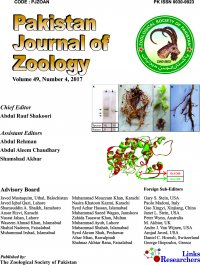Effect of Different Sonication Protocols on Merino Ram Sperm Parameters
Effect of Different Sonication Protocols on Merino Ram Sperm Parameters
Caner Öztürk1*, Mücahid Onay1 and Neşe Hayat Aksoy2
ABSTRACT
The biochemical analysis and the determination of the intracellular-extracellular contents of the sperm cells are important in the spermatological studies. Since homogenization processes reveal the intracellular contents of the sperm cells, we aimed to examine the optimal sonication procedure and the protective effect of the antioxidants against sonication. Four merino rams (2–3 years old) were used for semen collection, and the ejaculates were pooled and divided into five equal aliquots. The samples were diluted with a solution having different additives at 37 °C. The first two groups contained L-Cystine as an additive (2 and 4 mM), the next two groups had methionine as an additive (2 and 4 mM), and the last group had no additives (control). After dilution, the semen samples were cooled at 5 °C for 2 h and then stored in liquid nitrogen. For further evaluation, the samples were thawed at 38 °C for 30 s. A phase-contrast microscope (400x) was used to determine the sperm motility. PNA-FITC staining was used to examine the acrosome integrity under a fluorescence microscope. Total oxidant status (TOS) and total antioxidant status (TAS) were measured using ELISA. The methionine group showed an increase in the post-thaw motility (53.08 ±3.6%) and viability (47.5 ±2.9) percentages compared to the control group (46.68 ±2.9; 40 ±4.08%, p<0.05). All the groups with antioxidants showed decreased levels of TOS in all sonication replicates compared to the control group (p<0.05). The methionine group showed statistical differences in the TAS level measurements between the 4 and 8-repeat sonication compared to the control group (p<0.05). Upon the examination of the damaged sperm rates, no difference was found between 8 and 12-repetitions (p>0.05). The result of our study showed that methionine had a cryoprotective effect on motility, acrosome integrity, and TOS levels and was also found to have beneficial effects at TAS levels. Considering the percentage of the damaged sperms, applying 8-repeat (4 seconds) was found to be the most suitable measurement.
To share on other social networks, click on any share button. What are these?









